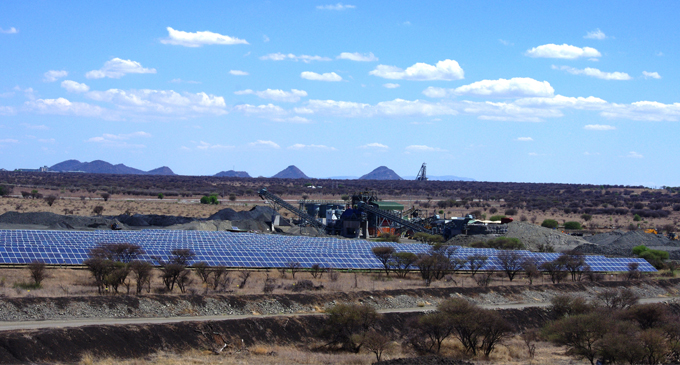Load shedding, increased electricity rates for mining companies and a solar tender at 6.02US¢/kWh redefine the rules of power generation in Zambia
Berlin/Munich, June 2016 – In recent years, an ongoing drought has caused a severe power crisis in Zambia. The new analysis “Power crisis and consequences for solar energy in the Zambian mining sector” from the Deutsche Gesellschaft für Internationale Zusammenarbeit (GIZ) GmbH in its role as facilitator of the Project Development Programme (PDP) and THEnergy shows that the framework conditions for investments in solar have become more attractive. The power crisis has caused Zambia to take emergency measures at extremely high costs to close the gap between generation and electricity consumption. The mining industry is by far the biggest consumer of electricity in Zambia and is suffering greatly. Production is impaired by load shedding and power outages. Sometimes the only remedy is to use stand-by diesel gensets for baseload electricity generation. Power from diesel is expensive, and so is grid power for mines. At the beginning of the year, the rates for miners have been raised to 10.35US¢/kWh, with further increases expected—and this in a country that used to have an abundance of inexpensive electricity from huge hydropower plants. A sustainable improvement of this situation is not in sight, as some new power plants will be completed in the next few years, but at the same time, the output capacity of the Zambian mines is expected to double, as significant investments have been made in past years.
A recent solar tender by Zambia’s Industrial Development Cooperation for two 50 MWp solar power plants has caught the attention of the mining industry. The best offer was at US¢6.02/kWh, which is a significantly lower price than Zambia pays for emergency solar power and than mining companies pay for either grid or diesel electricity.
The analysis shows that local solar-diesel hybrid microgrids have become an interesting alternative. “We have also observed in other countries of the region that industrial players, such as mining companies, lose large amounts of profit due to an unreliable power supply,” says Tobias Cossen, Project Manager for Southern Africa at PDP. “In Zambia, the negative effects are twofold: severe production losses and higher electricity costs at the same time.” This development drives mining companies to become more self-sufficient. Zambia has excellent sun irradiation, which has a positive effect on electricity prices from photovoltaic (PV) power plants. “The recent PV tender comes at the right time,” adds Thomas Hillig, founder of the consultancy THEnergy. “It shows what development solar energy has made in the past few years; 6.02US¢/kWh is competitive with any kind of conventional energy, especially in a region that suffers from a lack of peak power during the day.”
Decentralized power generation in the form of solar-diesel hybrid microgrids has advantages beyond price. It allows for a robust power supply in off-grid or weak-grid areas, such as Zambia, where the grid sometimes poses severe reliability issues. In microgrids, solar power, grid electricity and diesel back-up power can be integrated. Typically, solar energy has priority in these power plants, as hardly any direct cost is associated with the operation of a PV system. The mines can invest their own capital or can secure long-term solar power supply through power purchase agreements with investors who build a PV plant and sell the electricity to the mine.
PDP and THEnergy are offering to accompany companies in this transition phase and will present at the ZIMEC 2016 exhibition and conference in Lusaka on June 23/24, 2016.
For further details regarding solar-diesel hybrid microgrids in the Zambian mining market, please have a look at the analysis:
http://www.th-energy.net/english/platform-renewable-energy-and-mining/reports-and-white-papers/
About Project Development Programme and the German Energy Solutions Initiative
The German Energy Solutions Initiative was implemented in 2002 and is under the patronage of the German Federal Ministry for Economic Affairs and Energy. Its target is to support German small and medium sized companies when entering the renewable energy and energy efficiency markets in foreign markets. As part of the German Energy Solutions Initiative, PDP, implemented by GIZ, focuses on developing countries in particular. PDP supports local-German business partnerships and assists in the development of reference projects in Zambia, Botswana, Mozambique, Ghana, Kenya, Madagascar, Mali and Tanzania. In 2015 PDP started the project “Renewables and Mining” in sub-Saharan Africa by promoting PDP at the “Zambia International Mining and Energy Conference and Exhibition” (ZIMEC) in Lusaka, Zambia. This year, PDP is pushing forward with managing its own “Renewables and Mining” session at the ZIMEC 2016.
About Dr. Thomas Hillig Energy Consulting (“THEnergy”)
THEnergy assists companies in dealing with energy-related challenges. Renewable energy companies are offered strategy, marketing and sales consulting services. For industrial companies THEnergy develops energy concepts and shows how they can become more sustainable. It combines experience from conventional and renewable energy with industry knowledge in consulting. In addition to business consulting, THEnergy advises investors regarding renewable energy investments in changing markets. It is also active in marketing intelligence and as an information provider in select fields, such as renewables and mining, through the platform th-energy.net/mining or renewables on islands through the new platform th-energy.net/islands.
For more information, have a look at www.th-energy.net
Contact for journalists:
THEnergy
Dr. Thomas Hillig
+49-152 3618 6442
press(at)th-energy.net
For images visit: www.th-energy.net/english/media-press

